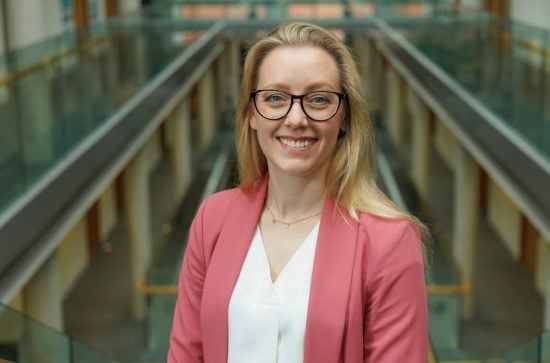Qualification : MICRO-CREDENTIAL (9)
Award Type and NFQ level : MICRO-CREDENTIAL
CAO/MU Apply code : MMC41;MMC43
CAO Points :
This 2-week intensive programme is a course of learning through the medium of English, for specific academic purposes, for staff working and teaching in Higher Education.
Language does not exist in isolation; it is used in both social and professional contexts to facilitate actions/needs/wants and to achieve specific goals or tasks. The emphasis of this course is not only on Academic English language use but also the critical skills and pedagogical areas within Higher Education where it is used. The MU programme, taught via English as a medium of instruction (EMI), will expose participants to a wide variety of Academic English lexis and metalanguage (the language of teaching) used in some of the most relevant areas of Higher Education today. This will facilitate a fully authentic teaching and learning context, where participants acquire through usage new linguistic content in Academic English.
Each days instruction will begin with a discussion on key pedagogical topics and themes from the programme, which will allow participants to share their own experience, knowledge and ideas in these key areas of practice in Higher Education. Discussion will be followed by the input (instruction) stage, using a variety of modes, e.g. lecture, PowerPoint, MP4s and PDFs. Participants will then actively apply their learning, both pedagogical and linguistic, in a variety of individual and group tasks. Finally, each class session will conclude with a summary of content covered, with an emphasis on English-language lexis and metalanguage. A Q&A session will also be included.
The programme level is set at CEFR C1.1.
Note: On successful completion of this micro-credential you will receive credits as per the European Credit and Transfer System. These credits are recognised by Maynooth University as credits aligned to learning completed at postgraduate level.
Applicants should hold at a minimum a 2:2 grade National Framework of Qualifications Honours (Level 8) award or an equivalent international qualification in a relevant discipline.
Applicants who do not hold a primary or higher degree but have sufficient and relevant professional experience are also welcome to apply. Please see our Recognition of Prior Learning (RPL) webpage for further information. Applicants who wish to apply via RPL must submit a completed copy of the RPL form along with any supporting documentation with their application.
For more information on the minimum English language requirements, please refer to the Language Competencies section of the Maynooth University Micro-credentials Entry Requirements and the English Language Requirements tab here for the tests and scores that are accepted.
In addition to the requirements listed above, all entrants should possess an English language level of CEFR B2.2

Academic

Academic
Department of French Studies
Department of School of Modern Languages
Department of Motherhood Project

Academic
Department of Spanish & Latin American Studies
Department of Motherhood Project
Department of School of Modern Languages
Department of Sexualities and Gender

Academic

Academic

Academic

Academic

Academic

Academic

Academic

Academic

Academic

Academic

Academic

Academic
Department of French Studies
Department of Motherhood Project
Department of School of Modern Languages

Academic

Academic
This 2-week intensive programme is a course of learning through the medium of English, for specific academic purposes, for staff working and teaching in Higher Education. The emphasis of this course is not only on Academic English language use but also the critical skills and pedagogical areas within Higher Education where it is used.
The module will foster discussion of how the participants professional practice and attitudes towards their own teaching are affected by the condition of teaching through the medium of English, including how this impacts upon the roles of lecturer and student. Participants will discuss the fundamental theoretical underpinnings of English-medium Instruction (EMI), including, for example, the idea of language as a tool for learning and communication; sociocultural and sociolinguistic issues of EMI, for example, meaningful authentic communication; and how EMI relates to other approaches, such as content and language integrated learning (CLIL). Participants will also be exposed to a number of teaching philosophies and will use these to adapt their own Teaching Philosophy Statements to the EMI situation.
The module uses immersive methods of language instruction, contextual usage, academically focussed discussion and application of key terms and lexis in practical tasks. Authentic language communication plays a pivotal role for participants, both in listening to module instruction (passive) and in discussion and questioning module topics, themes and tasks (active). Critical reflection also plays a central role in this module, and several theoretical models are utilised to better enable the participants to analyse their own professional practice and module learning, identifying any potentially weak areas and forming a viable action plan for future improvement.
All lexis employed throughout this module is academic in style and corresponds to the Academic Word List (AWL), thus giving participants valuable exposure to, and practice with, the authentic, native-user level language of teaching and learning within a Higher Education context. This will facilitate a fully authentic teaching and learning context, where participants acquire through using new linguistic content in Academic English.
The programme level is set at CEFR C1.1.
This course is not yet accepting applications. To be among the first to hear when applications open, please register your interest by completing this short form.
The following documents should be uploaded to your online application form:
- Valid passport / passport card OR birth certificate.
- Official University Degree Parchment or Transcript (if applying with a qualification). In such cases, the Transcript / Parchment must include full name, name of the qualification, conferring date and name of awarding body.
- Recognition of Prior Learning (RPL) application form (if applying as a professional with relevant experience).
- Marriage Certificate (for students who wish to register in their married name).
- Proof of English language competency (where applicable).
Note: failure to provide all necessary documents will result in a delay to your application being processed.




